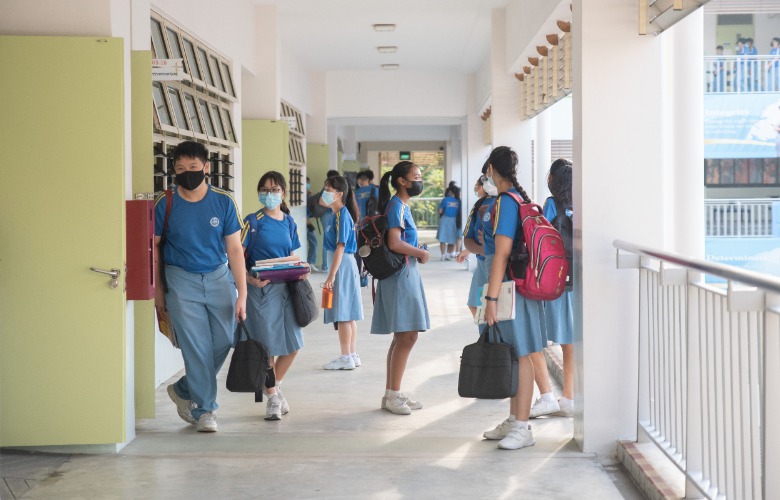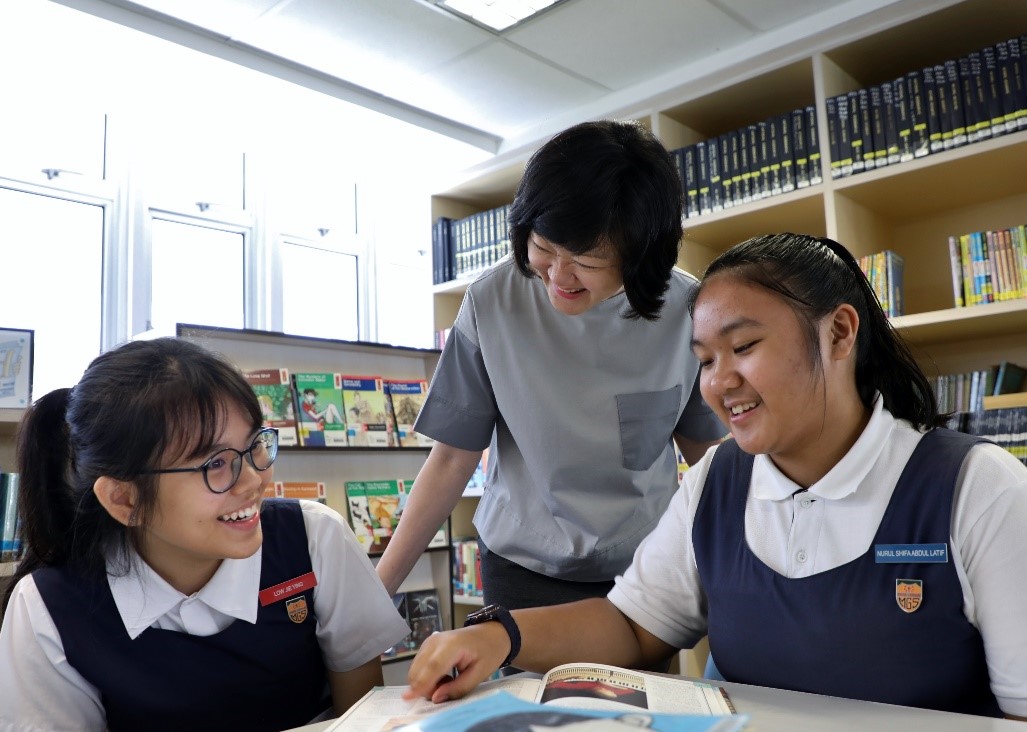Back in 2019, when teachers from Deyi Secondary School learnt that their school was set to pilot Full Subject-Based Banding (Full SBB), their initial response was mixed.
They would be getting a head-start on changes that secondary schools will roll out by 2024. The concept of subject-based banding (SBB) was not a foreign one – the year before, secondary school students had the option of taking certain subjects at a more demanding level should they show the aptitude and interest for it.
So why the hesitation at Deyi? Because of the advent of mixed form classes, they said. Express, Normal (Academic) and Normal (Technical) course students would be studying alongside one another in the same form class and taking six common subjects together for the first time.
A second wave of adjustments would come in 2024 when the three courses are removed. The 2024 Secondary 1 students will be able to take subjects at subject levels that suit them, based on their strengths, interests and learning needs. This cohort of students will also sit for a common national examination in 2027 and receive a certificate which reflects the subjects and subject levels at which they were offered.
What would a Full SBB school day look like at Deyi today? Students from all three courses will be grouped into different mixed form classes where they will take Common Curriculum subjects together, which comprise Character and Citizenship Education (CCE), Design and Technology (D&T), Food and Consumer Education (FCE), Music, Art and Physical Education (PE). Beyond these subjects, students would take English, Humanities, Mathematics, Mother Tongue Language and Science at one of three subject levels, based on their aptitude and interest.
When the teachers huddled to discuss how they would change their pedagogy and teaching for mixed form classes, they realised some of the practices and habits when teaching and addressing the three courses of students so far, based on their broad understanding of their learning and communication styles, will need to change.
Says Subject Head of Character and Citizenship Education, Form Teacher and Mathematics teacher Geetha D/O Salgunan, “It made me examine myself deeper for any biases I may be holding of what the different courses of students are like, and how I could teach in a way that brings out the best in all of them at a go.”
Deyi’s teachers were candid about the challenges of teaching classes that were less homogenous. For example, when the quieter types are seated with more outspoken learners, teachers would need to be more agile in attending to the wider spectrum of behaviour and learning styles. Would they be up to the task?
The transition was not easy, but they bit the bullet and understood that this is something we have to do together for the sake of our students. Full SBB classrooms mirror the real world, and we should prepare our children for the real world.
Mrs Lim Ai Poo, Principal of Deyi Secondary School
That was in 2019. After a year of planning and preparations, Deyi rolled out Full SBB in 2020. Fast forward to 2023, and the first batch of Full SBB students have entered Secondary 4.
Differences encourage growth
Full SBB offers more porosity in the education system to better support students in pursuing their different strengths and interests. Without fixed courses, students can also interact more freely regardless of their academic backgrounds.
When Deyi’s Secondary 1 students first stepped into their Full SBB mixed form classes three years ago, their teachers noticed a silent divide between students taking the Normal and Express courses. Normal students may be carrying with them some baggage from having weaker PSLE scores, while the students taking the Express course could have felt daunted by higher expectations of them, says Assistant Year Head (Lower Secondary), Mr Derek Lim.
The teachers were also cognisant of how students in each class come from a wider variety of personal backgrounds than they were used to. They knew they had a big part to play in breaking the ice and modelling inclusive and respectful behaviour for all.
.jpg) A Secondary 2 mixed form class decorating a Chinese New Year banner together in 2021. School events goes a long way in galvanizing the class to work together and bond.
A Secondary 2 mixed form class decorating a Chinese New Year banner together in 2021. School events goes a long way in galvanizing the class to work together and bond.
Ms Geetha recalls one of her Math lessons where the topic was on hire purchase. When cars and flat-screen televisions were brought up as big-ticket items, a student remarked innocently that they can’t be, since they are affordable. His sentiment was not shared by many others around him, so Ms Geetha turned it into a teachable moment on empathy – for them to try to see life from more perspectives than they are used to. She also drew attention to what they have in common.
“One anecdote I always use is that ‘almost everybody eats at a hawker centre’. It is always good to point out the commonalities that we have as Singaporeans, especially so in Full SBB classrooms where our students come from a wider variety of backgrounds,” she adds.
Other teachers share similar experiences in their Full SBB classes.
“We cannot disregard a student just because he or she gives a politically incorrect answer,” says Ms Eleanor Wong, Subject Head of Geography. “As teachers, we need to role model how to listen with an open mind, facilitate the conversation and put the students in one another’s shoes.”
Mr Timothy Ong, Subject Head of English, agreed. “I don’t want anyone to feel they shouldn’t speak up at all or that they don’t belong. Every opinion is valid and should be shared respectfully.”
Full SBB brings new opportunities
When this first batch of Full SBB students entered Secondary 2, those who did well for certain subjects were offered the chance to pursue them at a more demanding level.
For example, students from the N(A) or N(T) course who performed well and showed a keen interest in a particular Humanities subject such as Literature, Geography or History could take that subject at a more demanding level.
However, not every student jumped at this opportunity. They were worried about possibly increased demands on their time and effort.
The students understand the commitment involved in taking a subject of a higher rigour, they work hard for it and prove it to themselves that they actually can do as well as their peers on the same level.
Ms Eleanor Wong, Subject Head of Geography
Understanding this, the teachers set out to build up their confidence, lend support, and instil a never-give-up mentality for the initial surge in commitment.
Ms Wong says, “We don’t want students to have the mindset that if it gets difficult, the students give up and drop the subject.”
“We treat them all the same, but at the same time we are aware that these students might require more support or attention. This is offered subtly, we will go and help them one-on-one, rather than call them out in class so it does not affect their confidence.” says Mr Ong.
.jpg) Deyi Secondary’s students participating in an assessment practice during Drama class. Students are grouped according to their index numbers rather than their courses, to ensure a good mix of skillsets.
Deyi Secondary’s students participating in an assessment practice during Drama class. Students are grouped according to their index numbers rather than their courses, to ensure a good mix of skillsets.
Over at Drama class, teachers had another challenge to address.
In Deyi, students take Drama in their form classes. Mr Alvin Khoo, an Art and Drama teacher, would notice how the students taking the N(A) and N(T) courses would gravitate towards roles requiring more movement and action, while the students taking the Express course would pick the ones needing more narration, based on their areas of confidence.
The teachers knew better and would assign roles in ways to challenge these stereotypes. After all, if students taking the Express course had no Normal course classmates to compare with, wouldn’t some students from the Express course step up for the swashbuckler or dancer roles, and do well in them too? Conversely, couldn’t some charming orators emerge from among students taking the Normal course if they had no classmates taking the Express course to share the stage with? “The students subsequently realised that it is not about their talent; it’s about the effort that they put in,” says Mr Khoo.
Establishing a positive learning culture
Such intentional efforts from the teachers soon rubbed off on the students, who grew less course-conscious and simply looked for ways to play to one another’s strengths.
“I have walked into a class and seen some of my students who willingly helping their peers with their schoolwork. These are students who don’t share the same class for that subject; they merely share the same form class,” says Ms Geetha with pride.
Beyond academics, Ms Eileen Tan, a Science teacher and teacher-in-charge of the Student Council, observed an upward trend of students taking the Normal courses who volunteered to run for leadership positions in the Council in the years since Full SBB was rolled out.
“We see an encouraging mindset shift. When classes were differentiated by courses, students often limit themselves; they don’t feel they are good enough to be leaders. But now, we don’t sense that anymore; they want to take on leadership roles because they feel that they are up for the challenge.” says Ms Tan.
FCE teacher Amelia Oh concurred. “Children can adapt very well. We are giving them a safe environment to grow and interact in, with fewer walls. We can see that they are thriving.”
Always keeping the students in mind
Mrs Lim Ai Poo, Principal of Deyi Secondary School, explains why her school embraced the Full SBB programme with open arms three years ago.
The enhanced customisation in learning for all students, and the increased diversity of its classrooms today, tell her that Full SBB is a step in the right direction.
Her teachers have only praise for the changes, their memory of the teething pains long overshadowed by the growth they see in their Full SBB students versus past cohorts.
“The transition was not easy, but they bit the bullet and understood that this is something we have to do together for the sake of our students. Full SBB classrooms mirror the real world, and we should prepare our children for the real world.






